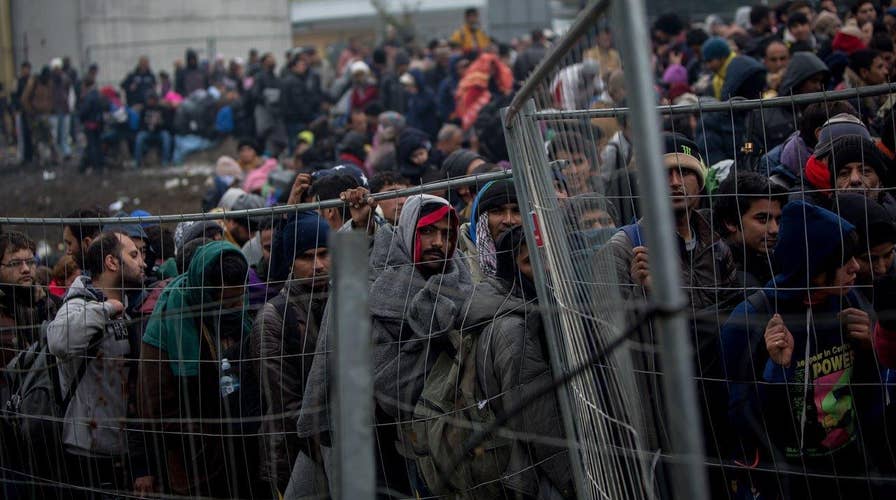Is Europe's plan to handle refugees a 'political charade'?
Defcon 3: KT McFarland and Soeren Kern on what is being done to deal with the ongoing refugee crisis in Europe
BRUSSELS – Austria vowed to press ahead early on Friday with plans to cap the number of asylum seekers entering the country despite claims the move would break the law, as European Union leaders struggled to end their fragmented approach to managing Europe's biggest refugee emergency since World War II.
In tense late night talks in Brussels on Thursday, the leaders also decided to hold a summit in early March with Turkey, which has been the source of hundreds of thousands of people arriving in the EU over the last year to push Ankara to tighten border controls.
More than 1 million people entered the EU in 2015 fleeing conflict or poverty, and some 84,000 have entered so far this year. Overwhelmed by the numbers and frustrated by their inability to agree on an effective European response, some EU countries have begun tightening border controls or putting up fences without warning their neighbors.
In the latest in a series of uncoordinated and unilateral measures by nations, Austria announced that it would allow no more than 80 people a day to apply for asylum at its southern border points, as of Friday.
But the EU's top migration official, Dimitris Avramopoulos, said that "Austria has a legal obligation to accept any asylum application that is made on its territory or at its border."
In a letter to Austrian Interior Minister Johanna Mikl-Leitner, seen by The Associated Press, Avramopoulos said that a ceiling on asylum-seekers "would be plainly incompatible with Austria's obligations" under EU and international law.
Austria's chancellor, Werner Faymann, was not moved, saying that his country would only accept 37,500 applications this year as planned.
"Last year, we had around 6,000 more asylum applications than Italy. We have had a lot more than asylum seekers than France. And anyone who has ever looked at a map knows that, for example, those two countries are larger than Austria and also have more inhabitants," he told reporters after the summit.
The new rift laid bare the frustration of nations destabilized by the arrival of so many people, and the lack of confidence that any timely, efficient European solution can be found.
Belgian Prime Minister Charles Michel said the room was divided "between those we believe we can find solutions together and those who prefer to act alone."
"Everyone's asking themselves the question; what do we do when we've put things in place but they're not working?" he said.
European Parliament President Martin Schulz pointed to selfishness and a lack of solidarity.
"The problem is that everyone sees the situation from their individual standpoint and waits for the other to move first in implementing those necessary solutions," Schulz told the leaders. "Lamentably, this crisis is exposing serious fault-lines within our union."
Dutch Prime Minister Mark Rutte said he understood the reaction of countries under stress like Austria, but he warned that the end result could be "the bunching up of great amounts of people in difficult circumstances in northern Greece."
Greece has been overwhelmed by the entry of some 850,000 people last year, mostly from Turkey. Thousands are still entering every week. The Greek coast guard has been swamped, and the country has barely 10,000 places to shelter those arriving.
The EU's executive Commission has given Greece three months to restore order on its borders, but few believe Athens will be able to meet the deadline. The Commission fears that countries on the main refugee route north are working to close Macedonia's border with Greece.
"If Greece and Turkey do not dramatically decrease the number of migrants coming to EU in next few weeks, then talk about closing the borders of Central Europe and securing the borders of Western Balkans will become a new reality," warned Czech Prime Minister Bohuslav Sobotka.
But Greek Prime Minister Alexis Tsipras appealed for the EU to "remain united and show solidarity."
"Europe cannot be rules for some and al la carte for others," he said.
In calling a summit with Turkey in just a few weeks, the leaders are looking at ways to persuade it to deliver on its pledge to crack down on refugees trying to cross into Greece.
The EU has offered Ankara 3 billion euros for the more than 2 million Syrian refugees on its territory, as well as easing visa rules for Turks and the fast-tracking of its EU membership process.
"It is good if Europe and Turkey share the burden, but we need clearer protection of the external borders, we need a fight against smugglers and illegality — we have to find legal ways for people to come to the European Union," German Chancellor Angela Merkel said.









































